Janai Purnima and Raksha Bandhan are the religious Hindu festivals of Nepal. Here is everything you need to know about the Janai Purnima, Rakshya Bandhan & Kwati Khane Din festivals in Nepal.
In the diverse geography of Nepal, diverse festivals are celebrated that hold cultural significance by the Nepalese, and Janai Purnima is one of them. ‘Janai’ means a sacred thread and ‘Purnima’ means full moon in the Nepali language.
On the full moon day, Hindu pilgrims, mainly Brahmin and Chhetri men, change the sacred thread, which they wear the whole year around their bodies. On the other hand, Newar celebrates this day as ‘Kwati punhi’ or ‘Gunhi Punhi’. Similarly, Hindus in Terai region celebrate the same day as ‘Rakshya Bandhan’.
If you are curious about this Janai Purnima/ Gunhi Punhi/ Rakshya Bandhan, read till the end as I’ll tell you in detail about these festivals in Nepal.
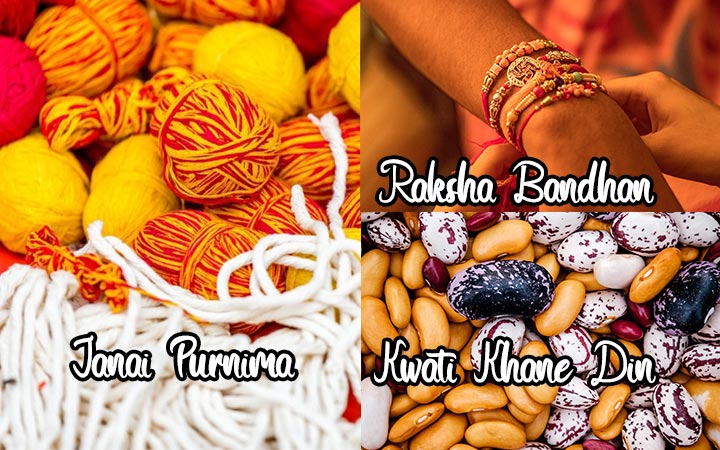
About Janai
A Janai consists of three to six cotton threads, and each thread has a meaning to it. The two ends of the threads are tied into a knot to form a circle, during which, the priest spells mantras dedicated to various gods.
It is then placed diagonally across the left shoulder to the right waist. Those six threads of Janai have this unique symbolism according to Hindu myths.
Three of the strains symbolize Brahma, Vishnu, and Maheshwar. And, the other three strains symbolize knowledge, worship, and karma.
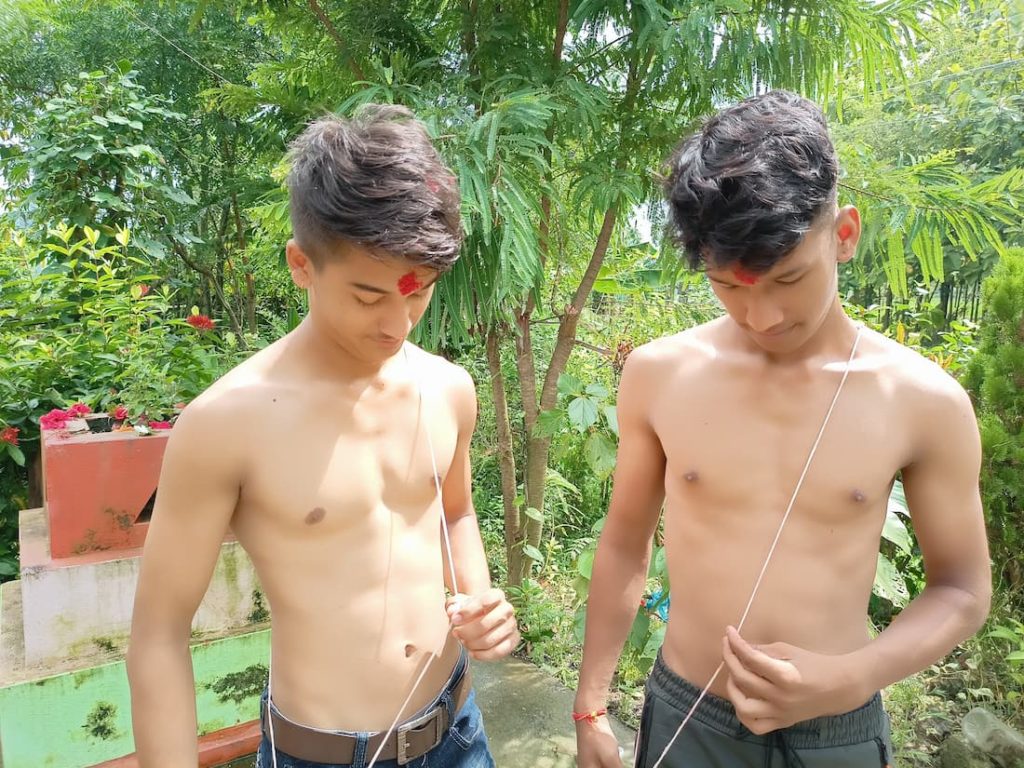
Why is Janai Purnima celebrated?
Well, this so-called sacred, lightweight, handmade cotton thread holds deeper religious significance to the Nepalese. Janai represents purity and safety.
For Brahmins, Janai has much importance in their life. A Janai represents maturity as it is handed to the men during their Bratabandha, which is a unique event that indicates the end of boyhood. A boy who hasn’t performed Bratabandha does not wear Janai.
Similarly, a Janai is identified as a holy thread that bestows knowledge, wisdom, strength, positivity, and prosperity to the wearer. It is believed that God lives in every fiber of Janai, so embracing a Janai purifies body, soul, and mind and protects from negative energy.
How is Janai Purnima celebrated?
A special ritual is performed while celebrating Janai Purnima. Usually, a man who has performed bratabandha is eligible to wear Janai. It means he is capable of understanding the religious significance of Janai and performing Yagya and puja.
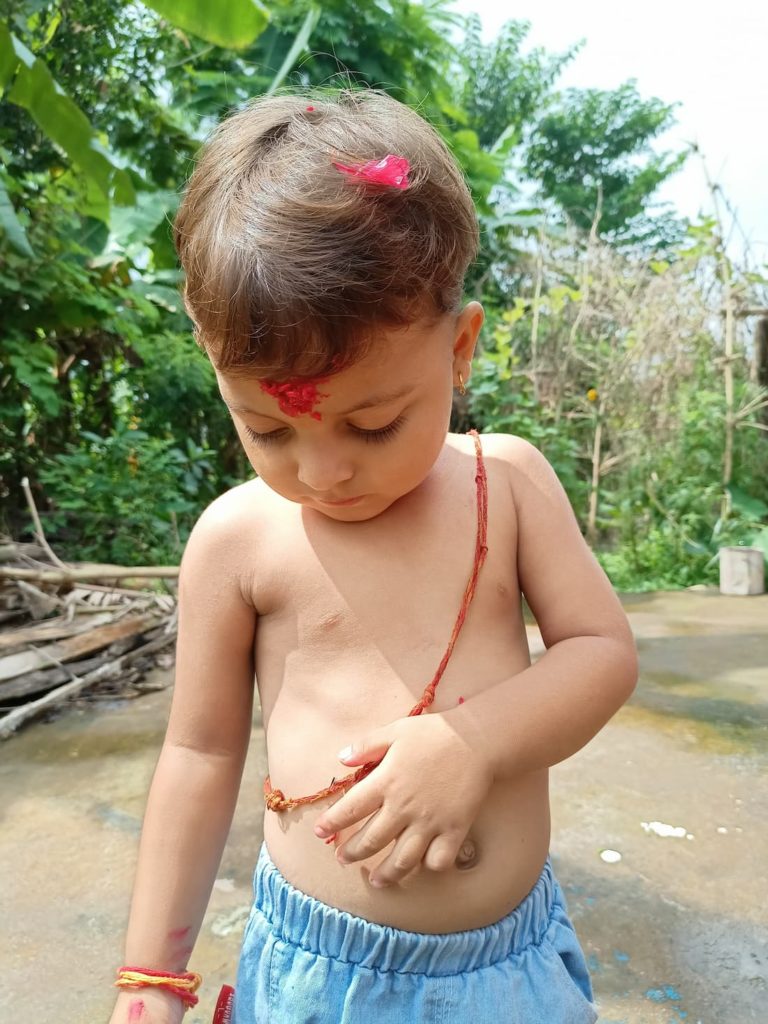
Brahmins, who wear Janai all year long across their body, do not consume meat products. A day before Janai Purnima, they fast partially as they avoid meat, garlic, and onions in their meal.
Then, on the Janai Purnima, Brahmin men take a bath early in the morning and prepare for a ritual to change the Janai. They usually visit nearby Hindu temples where a priest utters mantras and rituals to wear new Janai.
Thousands of Hindu pilgrims visit the holy lake called Gosainkunda, which is believed to be the resting place of Lord Shiva. Gosainkunda is a massive lake located at an altitude of 4,380m inside the Langtang National Park.
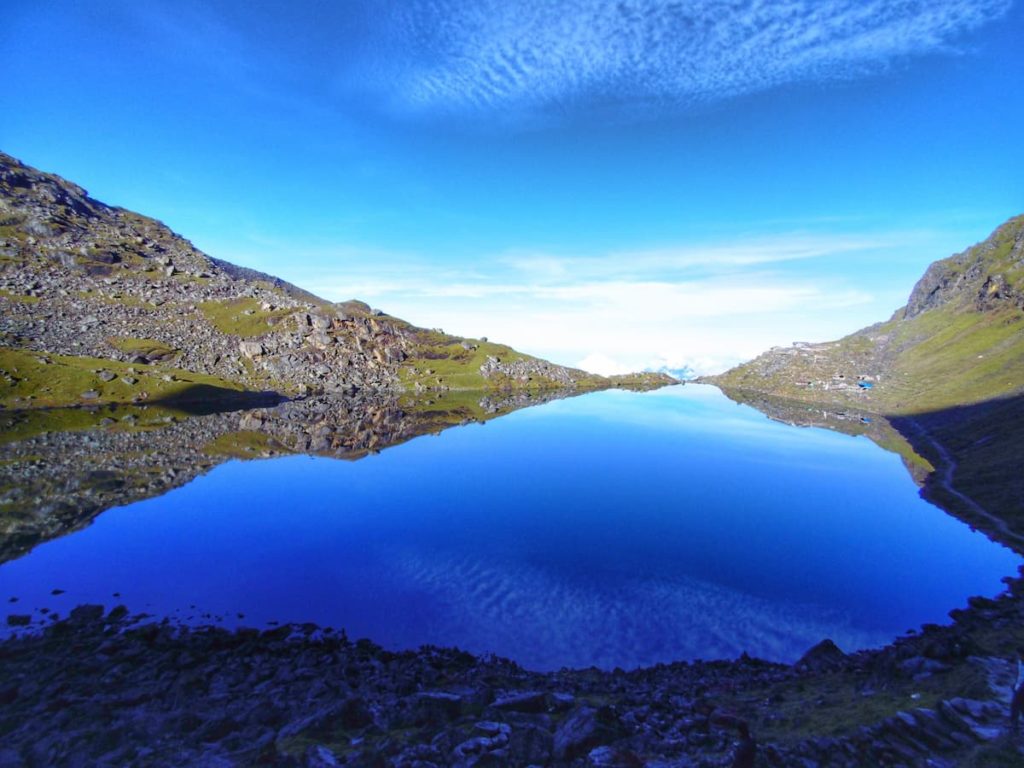
According to Hindu mythologies, Lord Shiva saved the world from the venomous poison by engulfing it. But, Lord Shiva kept it in the middle of his throat so he wouldn’t die of the poison.
The poison was so venomous that Lord Shiva couldn’t tolerate the pain. He then jumped into the cold Gosainkunda lake, where he cooled down. Since then, it is believed that Lord Shiva has been resting in the Gosainkunda lake.
The pilgrims take holy dips in the lake to cleanse their bodies and soul. The holy dip is also said to remove sins. After taking the holy bath, the men remove their old Janai and replace it with the new one.
How is Rakshya Bandhan celebrated?
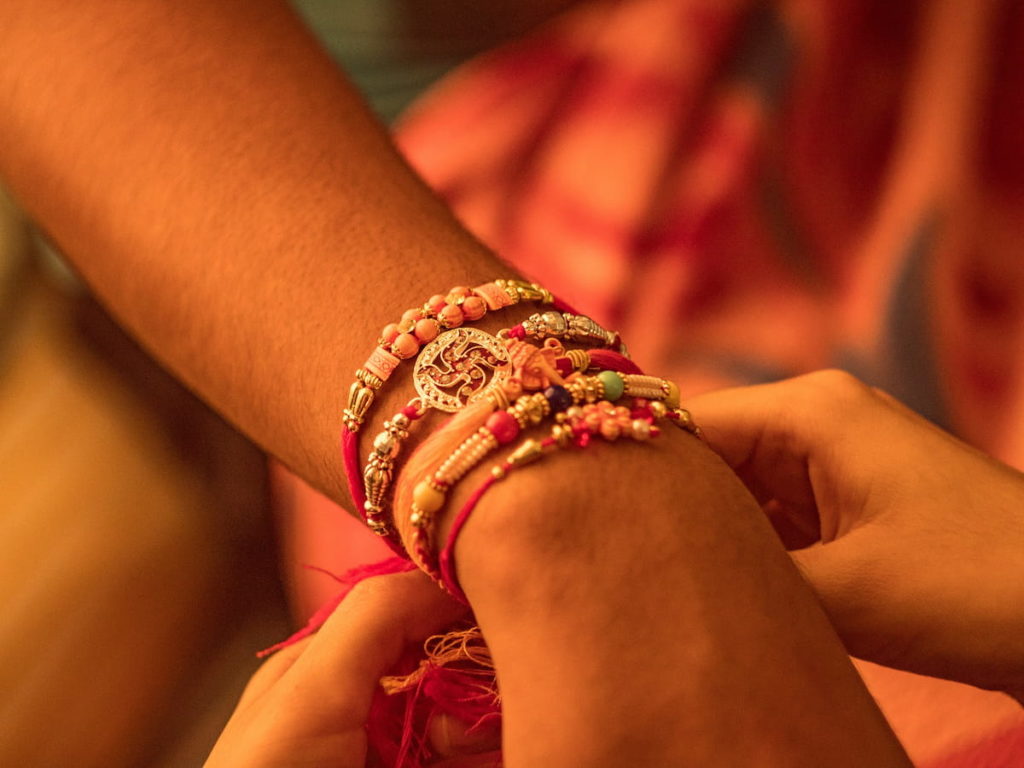
Rakshya Bandhan is celebrated on the same day as Janai Purnima. Rakshya means to protect, and Bandhan means a tie. So, rakshya Bandhan means ‘a tie of protection’.
Rakshya Bandhan is slightly similar to Bhai Tika, which is celebrated during the last day of Tihar. On Rakshya Bandhan, sisters tie Rakhi on the wrist of their brothers. The sister ties rakhi on the wrist of their brother so that the sacred thread will protect the brother from negative energy.
Sisters who are not sisters by blood but accept the man as their brother also tie rakhi on their wrists. So the thread of rakhi has the power to strengthen the brother-sister bond. After tying the rakhi, it now also becomes the duty of the brother to protect his sister from any obstacles.
On Rakshya Bandhan, the brother and sister both take baths. The Hindus have a tradition of wearing ethnic clothes, but it is not mandatory to wear any specific attire during Rakshya Bandhan.
Then, the sister prepares a puja thali to worship her brother. The sister puts a tika on her brother’s forehead and puts a garland around his neck.
Then, the sister ties rakhi on her brother’s wrist praying to god to protect her brother from obstacles. In return, the brother presents his sister with gifts. The brother then takes a blessing from his sister by bowing down to her feet. In this way, Rakshya Bandhan is celebrated in Nepal.
How is Kwati Punhi celebrated?
The Newar community celebrates the same day as Kwati Punhi or Gunhi Punhi or Kwati Khane Din. They tie a ‘dora’ on their wrist on this day as they do not wear Janai on their body.
They take a bath early in the morning and visit a nearby temple, where they will find a priest who ties dora. A dora is a thread just like Janai but worn on the wrist.
The next day of Janai Purnima is followed by Gai Jatra. On this day, the dora tied on the wrist is now tied on the tail of a cow. It is believed that the cow will guide the soul to heaven afterlife.
After tying the dora, Newar celebrates Gunhi Punhi or Kwati Punhi by preparing a special dish at their home. The special dish is called ‘Kwati’.
Kwati is said to bring strength and warmth to our bodies. The Kwati is prepared only on this very day, so the name Kwati Punhi occurred.
Kwati is a thick soup made up of a combination of several beans and sprouts. The variety of beans and sprouts ranges from 9 to 12 types.
The beans and sprouts are soaked in water a day earlier so that it becomes soft. Then, the next day, it is put in the pressure cooker with various spices and lots of water. After a few whistles, the Kwati is ready to be served.
Frequently Asked Questions
What is Janai Purnima?
Janai Purnima is a Hindu festival that is celebrated in Nepal. It is also known as the sacred thread festival. On this day, Hindus take a sacred bath in the river/home and change their Janai, which is a thread that is worn around the wrist.
When is Janai Purnima celebrated?
Janai Purnima falls during the full moon day in the month of the Shrawan according to the Nepali calendar.
Where is Janai Purnima celebrated?
Janai Purnima is celebrated in different parts of Nepal by Hindus.
What is the significance of Janai Purnima?
Janai Purnima has great religious and cultural significance in Nepal. It is believed that taking a bath in the river on this day will cleanse one’s body and soul. It is also believed that changing the Janai will protect one from evil spirits.
What is a Rakhi?
A Rakhi is a thread tied by the sisters on the wrists of their brothers. Traditionally, rakhi used to be a simple thread. But, in modern times, rakhi is available to purchase in a variety of colors and attractive designs.
Are Janai Purnima and Rakshya Bandhan the same?
Though Janai Purnima and Rakshya Bandhan fall on the same day, they are not celebrated in the same manner. Janai Purnima is celebrated by changing the old Janai with a new one each year. On the other hand, Rakshya Bandhan is celebrated by sisters tying Rakhi on the wrist of their brothers.
Conclusion
Janai Purnima and Raksha Bandhan are sacred festivals of Nepal celebrated by people of different ethnic groups with joy and religious belief.
If you want to observe the Raksha Bandhan & Janai Purnima festival in Nepal, make sure you visit Nepal during August/ September. You will get to explore the various cultures and learn more about Hindu mythologies on this day.
You can attend rituals performed by Brahmin priests and observe the unique rituals and traditions of Janai Purnima.
If you have any queries regarding Janai Purnima/Gunhi Punhi/Rakshya Bandhan, feel free to drop a comment below.
nice to see rakhi is celebrated in Nepal too, Nepali Sister Send Rakhi to India, show some love to Indian Brothers 🙂